It’s been a while since I last posted due to work and life in general. I’ve been working on several NFV projects and thought I’d share some recent testing that I’ve been doing…so here we go :)
Let me offload that for ya! Link to heading
In a multi-tenancy environment (OpenStack, Docker, LXC, etc), VXLAN solves the limitation of 4094 VLANs/networks, but introduces a few caveats:
- Performance impact on the data path due to encapsulation overhead
- Inability of hardware offload capabilities on the inner packet
These extra packet processing workloads are handled by the host operating system in software, which can result in increased overall CPU utilization and reduced packet throughput.
Network interface cards like the Intel X710 and Emulex OneConnect can offload some of the CPU resources by processing the workload in the physical NIC.
Below is a simple lab setup to test VXLAN offload data path with offload hardware. The main focus is to compare the effect of VXLAN offloading and how it performs directly over a physical or bridge interface.
Test Configuration Link to heading
The lab topology consists of the following:
- Nexus 9372 (tenant leaf) w/ jumbo frames enabled
- Cisco UCS 220 M4S (client)
- Cisco UCS 240 M4X (server)
- Emulex OneConnect NICs
Specs:
Lab topology Link to heading
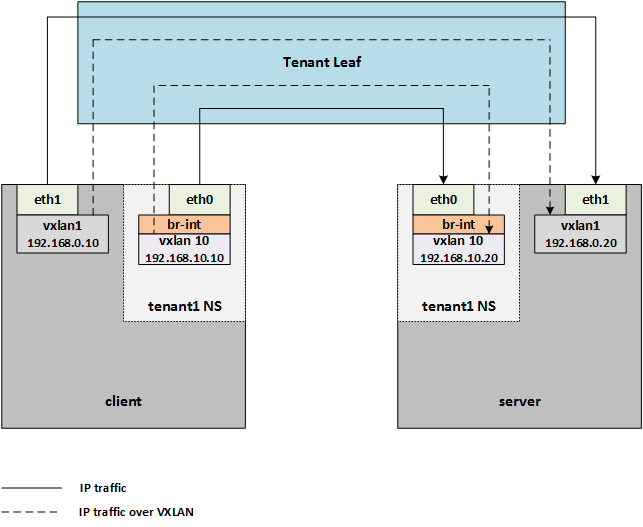
Four types of traffic flows have been used to compare the impact of Emulex’s VXLAN offload when the feature has been enabled or disabled:
ethtool -k <eth0/eth1> tx-udp_tnl-segmentation <on/off>
Tools Link to heading
Netperf was used to generate TCP traffic between client and server. It is a light user-level process that is widely used for networking measurement. The tool consists of two binaries:
- netperf - user-level process that connects to the server and generates traffic
- netserver - user-level process that listens and accepts connection requests
**MTU considerations: VXLAN tunneling adds 50 bytes (14-eth + 20-ip + 8-udp + 8-vxlan) to the VM Ethernet frame. You should make sure that the MTU of the NIC that sends the packets takes into account the tunneling overhead (the configuration below shows the MTU adjustment).
Client Configuration Link to heading
# Update system
yum update -y
# Install and start OpenvSwitch
yum install -y openvswitch
service openvswitch start
# Create bridge
ovs-vsctl add-br br-int
# Create VXLAN interface and set destination VTEP
ovs-vsctl add-port br-int vxlan0 -- set interface vxlan0 type=vxlan options:remote_ip=<server ip> options:key=10 options:dst_port=4789
# Create tenant namespaces
ip netns add tenant1
# Create veth pairs
ip link add host-veth0 type veth peer name host-veth1
ip link add tenant1-veth0 type veth peer name tenant1-veth1
# Link primary veth interfaces to namespaces
ip link set tenant1-veth0 netns tenant1
# Add IP addresses
ip a add dev host-veth0 192.168.0.10/24
ip netns exec tenant1 ip a add dev tenant1-veth0 192.168.10.10/24
# Bring up loopback interfaces
ip netns exec tenant1 ip link set dev lo up
# Set MTU to account for VXLAN overhead
ip link set dev host-veth0 mtu 8950
ip netns exec tenant1 ip link set dev tenant1-veth0 mtu 8950
# Bring up veth interfaces
ip link set dev host-veth0 up
ip netns exec tenant1 ip link set dev tenant1-veth0 up
# Bring up host interfaces and set MTU
ip link set dev host-veth1 up
ip link set dev host-veth1 mtu 8950
ip link set dev tenant1-veth1 up
ip link set dev tenant1-veth1 mtu 8950
# Attach ports to OpenvSwitch
ovs-vsctl add-port br-int host-veth1
ovs-vsctl add-port br-int tenant1-veth1
# Enable VXLAN offload
ethtool -k eth0 tx-udp_tnl-segmentation on
ethtool -k eth1 tx-udp_tnl-segmentation on
Server Configuration Link to heading
# Update system
yum update -y
# Install and start OpenvSwitch
yum install -y openvswitch
service openvswitch start
# Create bridge
ovs-vsctl add-br br-int
# Create VXLAN interface and set destination VTEP
ovs-vsctl add-port br-int vxlan0 -- set interface vxlan0 type=vxlan options:remote_ip=<client ip> options:key=10 options:dst_port=4789
# Create tenant namespaces
ip netns add tenant1
# Create veth pairs
ip link add host-veth0 type veth peer name host-veth1
ip link add tenant1-veth0 type veth peer name tenant1-veth1
# Link primary veth interfaces to namespaces
ip link set tenant1-veth0 netns tenant1
# Add IP addresses
ip a add dev host-veth0 192.168.0.20/24
ip netns exec tenant1 ip a add dev tenant1-veth0 192.168.10.20/24
# Bring up loopback interfaces
ip netns exec tenant1 ip link set dev lo up
# Set MTU to account for VXLAN overhead
ip link set dev host-veth0 mtu 8950
ip netns exec tenant1 ip link set dev tenant1-veth0 mtu 8950
# Bring up veth interfaces
ip link set dev host-veth0 up
ip netns exec tenant1 ip link set dev tenant1-veth0 up
# Bring up host interfaces and set MTU
ip link set dev host-veth1 up
ip link set dev host-veth1 mtu 8950
ip link set dev tenant1-veth1 up
ip link set dev tenant1-veth1 mtu 8950
# Attach ports to OpenvSwitch
ovs-vsctl add-port br-int host-veth1
ovs-vsctl add-port br-int tenant1-veth1
# Enable VXLAN offload
ethtool -k eth0 tx-udp_tnl-segmentation on
ethtool -k eth1 tx-udp_tnl-segmentation on
Offload verification Link to heading
[root@client ~]# dmesg | grep VxLAN
[ 6829.318535] be2net 0000:05:00.0: Enabled VxLAN offloads for UDP port 4789
[ 6829.324162] be2net 0000:05:00.1: Enabled VxLAN offloads for UDP port 4789
[ 6829.329787] be2net 0000:05:00.2: Enabled VxLAN offloads for UDP port 4789
[ 6829.335418] be2net 0000:05:00.3: Enabled VxLAN offloads for UDP port 4789
[root@client ~]# ethtool -k eth0 | grep tx-udp
tx-udp_tnl-segmentation: on
[root@server ~]# dmesg | grep VxLAN
[ 6829.318535] be2net 0000:05:00.0: Enabled VxLAN offloads for UDP port 4789
[ 6829.324162] be2net 0000:05:00.1: Enabled VxLAN offloads for UDP port 4789
[ 6829.329787] be2net 0000:05:00.2: Enabled VxLAN offloads for UDP port 4789
[ 6829.335418] be2net 0000:05:00.3: Enabled VxLAN offloads for UDP port 4789
[root@server ~]# ethtool -k eth0 | grep tx-udp
tx-udp_tnl-segmentation: on
Testing Link to heading
As stated before, Netperf was used for getting the throughput and the CPU utilization for the server and the client side. The test was run over the bridged interface in the Tenant1 namespace with VXLAN Offload off and Offload on.
Copies of the netperf scripts can be found here:
TCP stream testing UDP stream testing
Throughput:
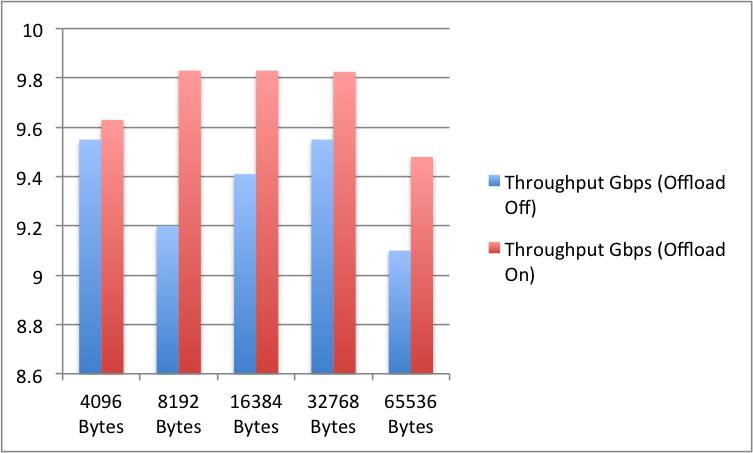 % CPU Utilization (Server side):
% CPU Utilization (Server side):
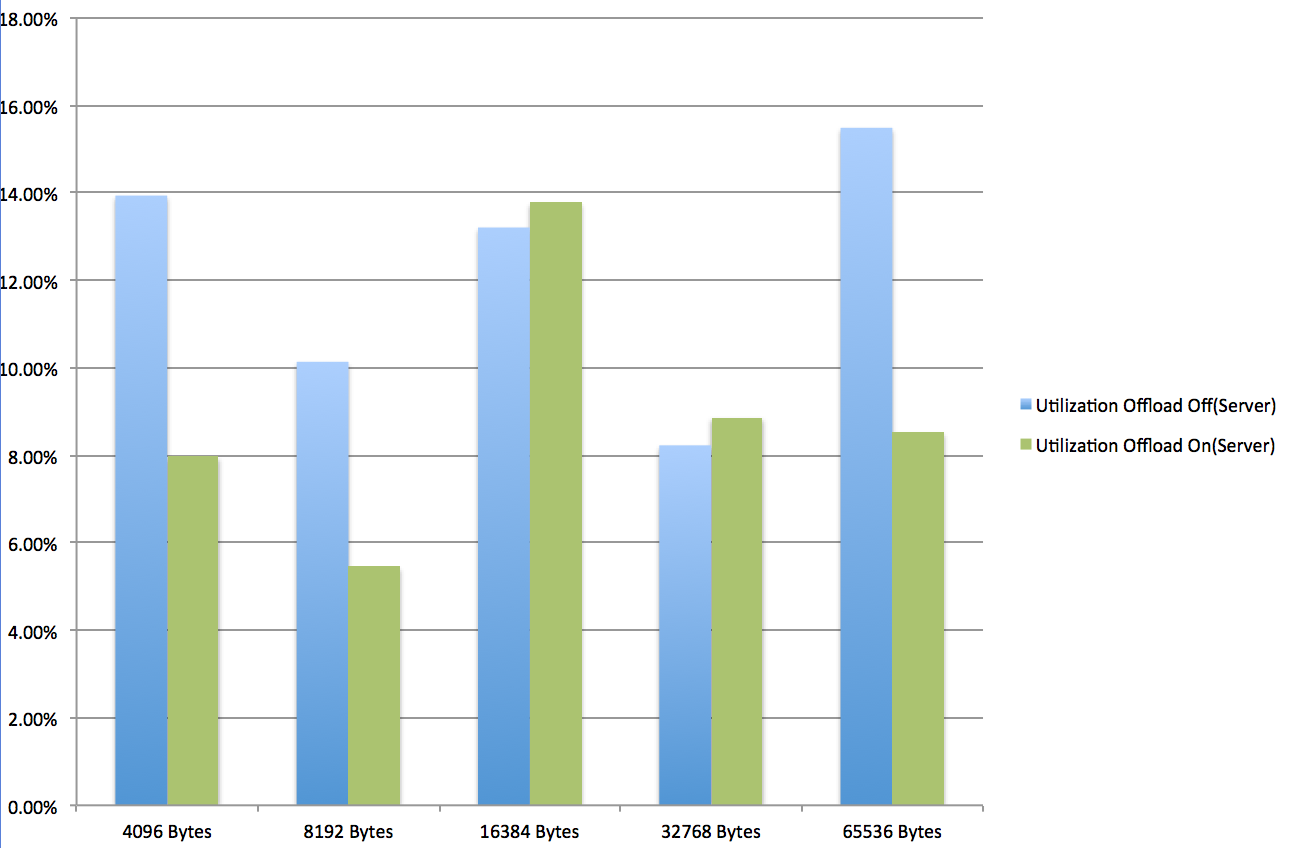 % CPU Utilization (Client side):
% CPU Utilization (Client side):
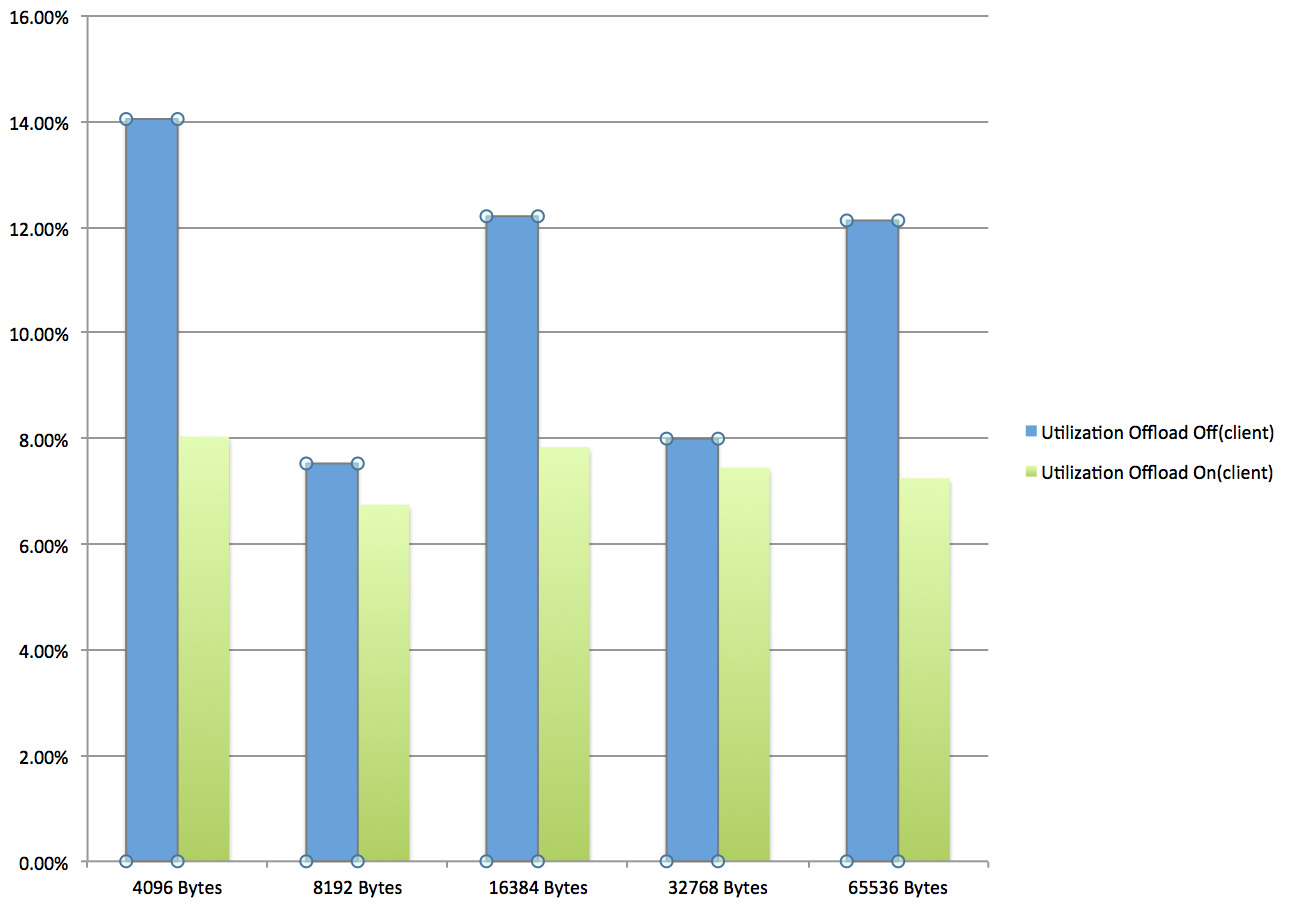
I conducted several TCP stream tests saw the following results with different buffer/socket sizes:
Socket size of 128K(sender and Receiver):
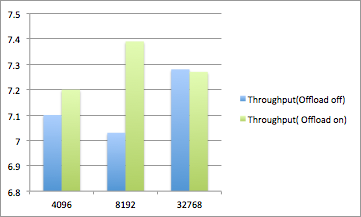 Socket size of 32K(sender and Receiver):
Socket size of 32K(sender and Receiver):
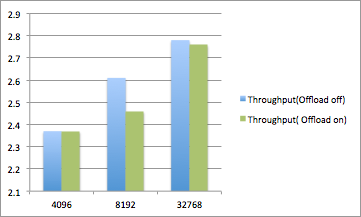 Socket size of 4K(sender and Receiver):
Socket size of 4K(sender and Receiver):
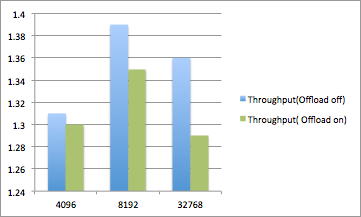
NETPERF Raw Results: Link to heading
Offload Off:
MIGRATED TCP STREAM TEST from 0.0.0.0 (0.0.0.0) port 0 AF_INET to 192.168.10.20 () port 0 AF_INET : +/-2.500% @ 99% conf.
!!! WARNING
!!! Desired confidence was not achieved within the specified iterations.
!!! This implies that there was variability in the test environment that
!!! must be investigated before going further.
!!! Confidence intervals: Throughput : 6.663%
!!! Local CPU util : 14.049%
!!! Remote CPU util : 13.944%
Recv Send Send Utilization Service Demand
Socket Socket Message Elapsed Send Recv Send Recv
Size Size Size Time Throughput local remote local remote
bytes bytes bytes secs. 10^6bits/s % S % S us/KB us/KB
87380 16384 4096 10.00 9591.78 1.18 0.93 0.483 0.383
MIGRATED TCP STREAM TEST from 0.0.0.0 (0.0.0.0) port 0 AF_INET to 192.168.10.20 () port 0 AF_INET : +/-2.500% @ 99% conf.
!!! WARNING
!!! Desired confidence was not achieved within the specified iterations.
!!! This implies that there was variability in the test environment that
!!! must be investigated before going further.
!!! Confidence intervals: Throughput : 4.763%
!!! Local CPU util : 7.529%
!!! Remote CPU util : 10.146%
Recv Send Send Utilization Service Demand
Socket Socket Message Elapsed Send Recv Send Recv
Size Size Size Time Throughput local remote local remote
bytes bytes bytes secs. 10^6bits/s % S % S us/KB us/KB
87380 16384 8192 10.00 9200.11 0.94 0.90 0.402 0.386
MIGRATED TCP STREAM TEST from 0.0.0.0 (0.0.0.0) port 0 AF_INET to 192.168.10.20 () port 0 AF_INET : +/-2.500% @ 99% conf.
!!! WARNING
!!! Desired confidence was not achieved within the specified iterations.
!!! This implies that there was variability in the test environment that
!!! must be investigated before going further.
!!! Confidence intervals: Throughput : 4.469%
!!! Local CPU util : 8.006%
!!! Remote CPU util : 8.229%
Recv Send Send Utilization Service Demand
Socket Socket Message Elapsed Send Recv Send Recv
Size Size Size Time Throughput local remote local remote
bytes bytes bytes secs. 10^6bits/s % S % S us/KB us/KB
87380 16384 32768 10.00 9590.11 0.65 0.90 0.268 0.367
MIGRATED TCP STREAM TEST from 0.0.0.0 (0.0.0.0) port 0 AF_INET to 192.168.10.20 () port 0 AF_INET : +/-2.500% @ 99% conf.
!!! WARNING
!!! Desired confidence was not achieved within the specified iterations.
!!! This implies that there was variability in the test environment that
!!! must be investigated before going further.
!!! Confidence intervals: Throughput : 7.053%
!!! Local CPU util : 12.213%
!!! Remote CPU util : 13.209%
Recv Send Send Utilization Service Demand
Socket Socket Message Elapsed Send Recv Send Recv
Size Size Size Time Throughput local remote local remote
bytes bytes bytes secs. 10^6bits/s % S % S us/KB us/KB
87380 16384 16384 10.00 9412.99 0.76 0.85 0.316 0.357
MIGRATED TCP STREAM TEST from 0.0.0.0 (0.0.0.0) port 0 AF_INET to 192.168.10.20 () port 0 AF_INET : +/-2.500% @ 99% conf.
!!! WARNING
!!! Desired confidence was not achieved within the specified iterations.
!!! This implies that there was variability in the test environment that
!!! must be investigated before going further.
!!! Confidence intervals: Throughput : 1.537%
!!! Local CPU util : 12.137%
!!! Remote CPU util : 15.495%
Recv Send Send Utilization Service Demand
Socket Socket Message Elapsed Send Recv Send Recv
Size Size Size Time Throughput local remote local remote
bytes bytes bytes secs. 10^6bits/s % S % S us/KB us/KB
87380 16384 65536 10.00 9106.93 0.59 0.85 0.253 0.369
Offload ON:
MIGRATED TCP STREAM TEST from 0.0.0.0 (0.0.0.0) port 0 AF_INET to 192.168.10.20 () port 0 AF_INET : +/-2.500% @ 99% conf.
!!! WARNING
!!! Desired confidence was not achieved within the specified iterations.
!!! This implies that there was variability in the test environment that
!!! must be investigated before going further.
!!! Confidence intervals: Throughput : 5.995%
!!! Local CPU util : 8.044%
!!! Remote CPU util : 7.965%
Recv Send Send Utilization Service Demand
Socket Socket Message Elapsed Send Recv Send Recv
Size Size Size Time Throughput local remote local remote
bytes bytes bytes secs. 10^6bits/s % S % S us/KB us/KB
87380 16384 4096 10.00 9632.98 1.08 0.91 0.440 0.371
MIGRATED TCP STREAM TEST from 0.0.0.0 (0.0.0.0) port 0 AF_INET to 192.168.10.20 () port 0 AF_INET : +/-2.500% @ 99% conf.
!!! WARNING
!!! Desired confidence was not achieved within the specified iterations.
!!! This implies that there was variability in the test environment that
!!! must be investigated before going further.
!!! Confidence intervals: Throughput : 0.031%
!!! Local CPU util : 6.747%
!!! Remote CPU util : 5.451%
Recv Send Send Utilization Service Demand
Socket Socket Message Elapsed Send Recv Send Recv
Size Size Size Time Throughput local remote local remote
bytes bytes bytes secs. 10^6bits/s % S % S us/KB us/KB
87380 16384 8192 10.00 9837.25 0.91 0.91 0.362 0.363
MIGRATED TCP STREAM TEST from 0.0.0.0 (0.0.0.0) port 0 AF_INET to 192.168.10.20 () port 0 AF_INET : +/-2.500% @ 99% conf.
!!! WARNING
!!! Desired confidence was not achieved within the specified iterations.
!!! This implies that there was variability in the test environment that
!!! must be investigated before going further.
!!! Confidence intervals: Throughput : 0.099%
!!! Local CPU util : 7.835%
!!! Remote CPU util : 13.783%
Recv Send Send Utilization Service Demand
Socket Socket Message Elapsed Send Recv Send Recv
Size Size Size Time Throughput local remote local remote
bytes bytes bytes secs. 10^6bits/s % S % S us/KB us/KB
87380 16384 16384 10.00 9837.17 0.65 0.89 0.261 0.354
MIGRATED TCP STREAM TEST from 0.0.0.0 (0.0.0.0) port 0 AF_INET to 192.168.10.20 () port 0 AF_INET : +/-2.500% @ 99% conf.
!!! WARNING
!!! Desired confidence was not achieved within the specified iterations.
!!! This implies that there was variability in the test environment that
!!! must be investigated before going further.
!!! Confidence intervals: Throughput : 0.092%
!!! Local CPU util : 7.445%
!!! Remote CPU util : 8.866%
Recv Send Send Utilization Service Demand
Socket Socket Message Elapsed Send Recv Send Recv
Size Size Size Time Throughput local remote local remote
bytes bytes bytes secs. 10^6bits/s % S % S us/KB us/KB
87380 16384 32768 10.00 9834.57 0.53 0.88 0.212 0.353
MIGRATED TCP STREAM TEST from 0.0.0.0 (0.0.0.0) port 0 AF_INET to 192.168.10.20 () port 0 AF_INET : +/-2.500% @ 99% conf.
!!! WARNING
!!! Desired confidence was not achieved within the specified iterations.
!!! This implies that there was variability in the test environment that
!!! must be investigated before going further.
!!! Confidence intervals: Throughput : 5.255%
!!! Local CPU util : 7.245%
!!! Remote CPU util : 8.528%
Recv Send Send Utilization Service Demand
Socket Socket Message Elapsed Send Recv Send Recv
Size Size Size Time Throughput local remote local remote
bytes bytes bytes secs. 10^6bits/s % S % S us/KB us/KB
87380 16384 65536 10.00 9465.12 0.52 0.90 0.214 0.375
Test results Link to heading
Line rate speeds were achieved in almost all traffic flow type tests with the exception of VXLAN over bridge. For VXLAN over physical flow test, the CPU utilization was pretty much similar to the baseline physical flow test as no encapsulation was taken place. When offload was disabled, the CPU usage increased by over 50%.
Given that Netperf is single process threaded, and forwarding pins to one CPU core only, the CPU utilization shown was an extrapolated result from what was reported by the tool which was N*8 cores. This also showed how throughput was effected by CPU resource as seen in the case with VXLAN over bridge test. Also, reduction in socket sizes produced higher CPU utilization with offload on, due to the smaller packet/additional overhead handling.
These tests were completed with the standard supported kernel in RHEL 7.1. There have been added networking improvements in the 4.x kernel that in separate testing increased performance by over 3x, although existing results are very promising.
Overall, VXLAN offloading will be useful in getting past specific network limitations and achieving scalable east-west expansions.
Code Link to heading
https://github.com/therandomsecurityguy/benchmarking-tools/tree/main/netperf